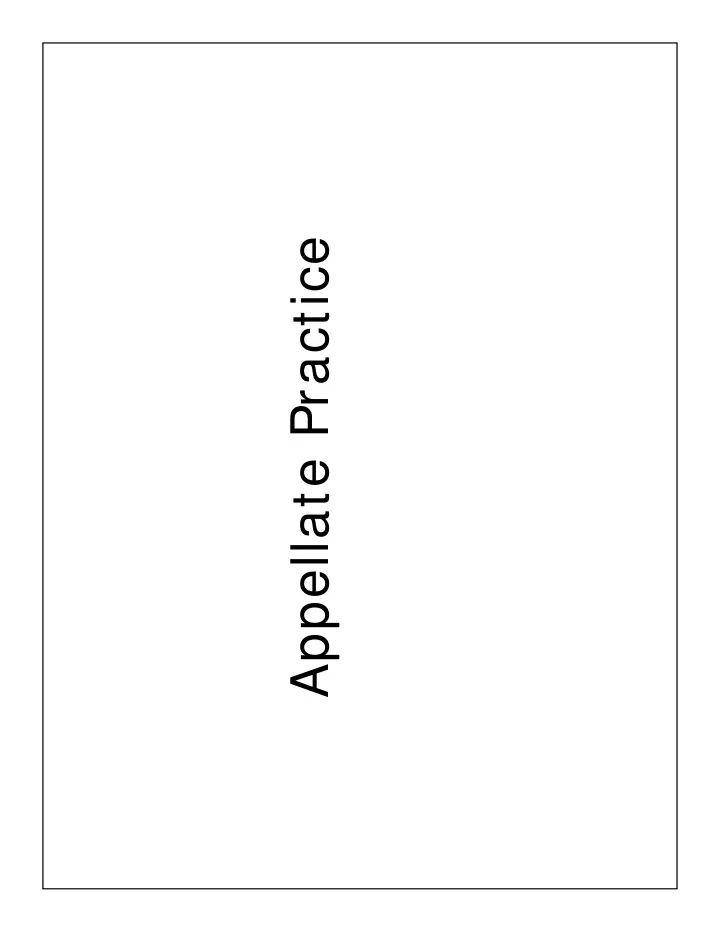

Appellate Practice
Source: Annual Report 2008 of the Judicial Council of the Supreme Court of La.
Jurisdiction • District court: Original jurisdiction • Courts of appeal: Appellate and supervisory Mostly supervisory • Supreme Court: (discretionary)
Function • District courts • Accept evidence • Determine facts • Apply law to facts • Courts of appeal • Correct error • Supreme Court • Develop the law
The gam e changes • In the court of appeal, no retrial. – Live with the record made in trial court. No new evidence. – Rule 1-3. – Standards of review • Fact findings—very deferential. • Discretionary calls—somewhat deferential. • Questions of law—de novo.
The gam e changes • The La. Supreme Court is not a second layer of appellate review. – Same restrictions as in court of appeal – Writ-grant considerations (LSC Rule 10)
Form s = Vam pires • “The world changes, we do not.” • Conform (maybe) to obsolete, outdated rules • Preserve bad legal writing
The rules • La. Const. art. V • Code Civ. P. arts. 2081-2201 • Code Crim. P. arts. 911-923 • Uniform Rules Cts. App. • Local Rules Cts. App. • La. S. Ct. Rules 10, 7, 8, and 9.
W here to find the rules • Courts’ web sites • Green books (in back of Rev. Stat. title 13) • West “La. Rules of Court” book
Supervisory w rits • Function – to obtain immediate appellate review of an interlocutory judgment. • See materials pp. 2–8.
Supervisory w rits • Substance – Limits on supervisory jurisdiction • Irreparable injury (materials pp. 2-3) • Herlitz (materials p. 4) – Standards of review • Fact-finding: manifest error • Discretionary calls: abuse of discretion • Legal questions: de novo
Supervisory w rits • Nuts and bolts: – See Unif. R. 4-1 thru 4-8 – See materials pp. 4–7
Supervisory w rits • Tips on writing.
Appeal • Taking the appeal • Writing the brief • Oral argument
Appeal • To take an appeal – Make sure the judgment is appealable – Perfect the appeal timely. • File motion for appeal and get judge’s signature on order granting appeal • If a suspensive appeal, furnish security – Pay estimated appeal costs – See materials pp. 9-13
Appeal • Notice of lodging – Triggers 15-day period for appellee to answer the appeal – Triggers 30-day period to request oral argument (Unif. R. 2-11.4) – Triggers briefing schedule (25 days for appellant, 45 days for appellee) – Borrow the record.
Speaking of the record … “Arguing about the law in the abstract is interesting and fun, but what wins cases is the lawyer’s ability to marshal the facts littered over an extensive trial court record in a way that's consistent with favorable controlling authority… In real-life appellate advocacy, the record plays a key role, and a lawyer’s mastery of the record—or lack thereof— often makes the difference between winning and losing.” Judge Alex Kozinski, In Praise of Moot Court—Not! , 97 Colum. L. Rev. 178, 189 (1997).
Appeal brief • See materials pp. 13–14 – Number of copies: Unif. R. 2-12.1 – Form: Unif. R. 2-12.2 – Cover: Unif. R. 2-12.3 – Content: • Appellant: Unif. R. 2-12.4 • Appellee: Unif. R. 2-12.5 • Reply: Unif. R. 2-12.6 – Time to file: Unif. R. 2-12.7
Citing cases La. style
Citing cases La. style W rong: Boudreaux v. State , 815 So. 2d 7 (La. 2002). Right: Boudreaux v. State , 2001-1329 (La. 2/ 26/ 02), 815 So. 2d 7. • In La. courts of appeal, give parallel citations to U.S. Supreme Court decisions. (Unif. R. 2-12.4.) • See materials pp. 22–23
Appeal brief • Additional writing tips.
Oral argum ent / Subm ission • See materials pp. 14–15 – Request for oral argument (Unif. R. 2- 11.4) – Rules 2-15.1 thru 2-15.4 – Time: • 40 minutes total (20 per side) • In La. 5 th Cir. (and lately, 1 st Cir.), 30 minutes total (15 per side)
Rehearing • See materials p. 15 – Available? Check Unif. R. 2-18.6 and 2-18.7 – 14-day deadline – 10-page limit – Not a prerequisite for writ application to La. Supreme Court – Timely filing interrupts 30-day time for writ application to La. Supreme Court (30 days runs anew from decision on rehearing or denial of rehearing)
Louisiana Suprem e Court
W rit-grant rates 2 0 1 1 14% 12% 18% Criminal Total Civil
Rule 1 0 § 1 ( a) w rit-grant considerations 1. Conflicting decisions 2. Significant unresolved issue of law 3. Overruling or modifying controlling precedent 4. Erroneous interpretation or application of constitution or law, and : • Material injustice, or • Significantly affects public interest 5. Gross departure from proper judicial proceedings
W rit application: nuts & bolts • See materials pp. 16–20 – Writ-grant considerations §1 – General filing requirements § 2 – Contents – civil writ app. § 3 – Contents – criminal writ app. § 4 – Time for filing § 5 – Oppositions § 6 – Reply to opposition § 7
I f w rit is granted • You must brief every issue raised in the writ application. – Any issue in the writ app. that is not briefed will be deemed abandoned. • You must not brief any issue not raised in the writ application. – Any issue not raised in the writ application is not properly before the Court. – “Reserving” an issue in a writ-app footnote does not preserve it.
Recommend
More recommend